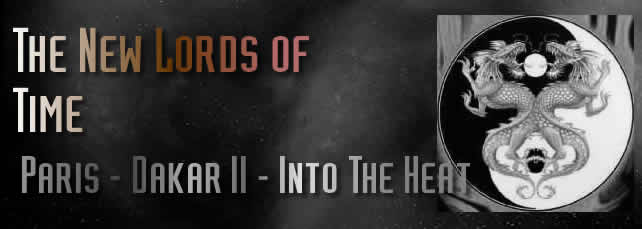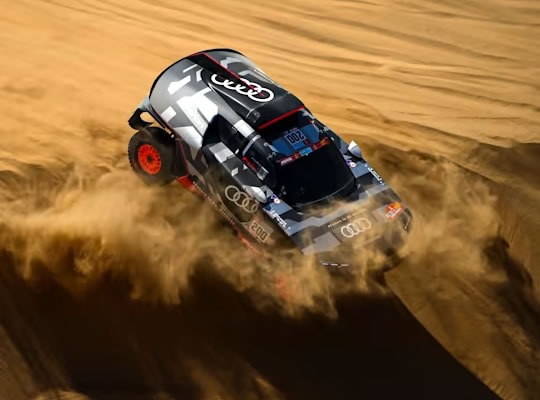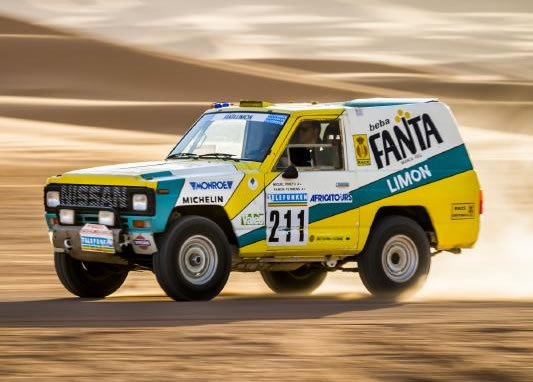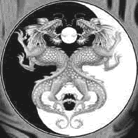

Tangier was famous, as far as Sukie was aware, for being the place where a lot of nineteeth and twentieth century French artists went to paint Plein Air pictures with bright sunshine as a dominant theme, and in the mid-twentieth century as the setting for intrigue in any number of spy novels.
What she saw as she and Earl began the second phase of the Paris-Dakar Rally was a city centre of glittering glass and steel skyscrapers surrounded by an ‘old city’ of mostly low-rise white buildings with exotically arched windows and doors. Earl theorised that much of this ‘old city’ was rebuilt in the last half century in an ‘old Moorish’ style in order to give tourists a false sense of that mid-twentieth century mystique of the Kasbah.
As their route out of the city hugged the coast the glass and steel was back in rows of hotels and then there was a suburb of low, square, mud-coloured working class housing that were never meant to be seen by the tourists.
None of it mattered very much to any of the rally competitors as they sped past both expensive and poor real estate and the waving, cheering onlookers who lined the streets to see the excitement.
Sukie in her Land Rover driver’s seat was focussed on the way ahead and really only saw any of the city in her rear view mirror as the poor suburbs ran out and they drove straight into the desert.
That the desert did, indeed, begin as soon as the suburbs stopped was something she had known from studying maps of the terrain, but it still came slightly as a shock when the off-road vehicle actually went ‘off road’ for the first time and the wheels crunched over hard-packed greyish-yellow sand.
She glanced once more in the mirror at the already distant city centre, then ahead at what seemed to be mostly featureless yellow-brown desert in three directions and on the other, the desert met the Atlantic Ocean. On all sides, land and water were met at the horizon by the pale blue overturned bowl of the sky with the sun nearly at its zenith, shining hotly down on it all.
“Wow!” she exclaimed, dropping the windscreen visor to mitigate against the glare of sunlight and the heat of the shadeless terrain hit her fully.
“I really expected it to be more yellow, and undulating.... Duney....” Earl commented. “This IS the Saharah? Like in Laurence of Arabia?”
“Western Saharah, technically,” Sukie answered. “A bit less arid just here. Ignore Laurence of Arabia, though. Half of that was filmed in South Wales.”
Earl thought that was something he could look up, later. The desert still posed a cultural puzzle for him, though.
“I saw some archive video of the original races,” he said. “There were cars dramatically rising over the crests of yellow dunes.”
“This part has had some irrigation programmes for growing crops. We’ll hit the ‘duney’ stuff in a day or two, don‘t worry. And a vehicle this will crest them dramatically enough. But I don’t think you’ll be allowed to use the word ‘duney’ in your log book.”
Earl laughed and turned from the apparently featureless view and studied his girlfriend appreciatively. She was dressed for the heat in light shorts and a cool, loose fitting blouse that looked oddly incongruous with the mandatory crash helmet. She looked like a petite, fragile but unremittingly determined adventuress from some twentieth century film, setting off across the desert to find a lost valley or help push an ambulance up a massive dune.
Not that he would have dared say anything like that out loud.
“It IS flatter than I was expexting,” Sukie remarked. “But we’re only just started. I expect there are obstacles ahead.”
“The sand gets everywhere even before the dunes,” Earl commented in reply, shaking the folds of his shirt. “And we’ve barely covered fifty kilometres. We’ll have to sweep it all out tonight or we’ll be carrying excess weight.”
“Better not be,” Sukie remarked “Nothing is going to slow us down. Even you can walk if you overeat at the do they’re putting on at Rabat for us tonight.”
She didn’t mean it, of course. She was grinning beneath the helmet. He could tell that by the waves of telepathic joy he felt coming from her. She was doing what she loved doing – driving – with him by her side.
They both found out that the territory was far from flat or featureless. There were hollows and depressions where they lost sight of the horizon for a while. Twice they crossed what they took for irrigation streams that helped make sections of the dessert fruitful. From a deep recess of his mind Earl recalled that sugar, olives and potatoes were among the principal crops Morrocan farmers produced as well as huge swathes of the dull but hardy cereals that could be turned into biofuel. He recalled from school how growing food crops and producing the biofuels was a difficult balancing act with a risk of upsetting the natural ecosystem thrown in for extra confusion.
He swatted away some winged and buzzing part of the ecosystem that came in with the sand and the fragrant breeze through the open windows and consulted the map where he had worked out their route for this shorter day than yesterday.
The route was more complicated and far longer than it might have been if they had plotted a direct way to Casablanca along the coast. The rally organisers had prepared time checks at Souk El Arbaa and Fez, both inland, and a mandatory stop in Rabat, where the King of Morocco had invited them to a civic reception at the Parliament Building, and then on down the coast to Casablanca and their first overnight bivouac.
Eleven hours of driving time in all. A shorter day than yesterday and those days ahead, but a true taste of the trial still to come.
They rejoined the national road system as they approached Souk El Arbaa, a small town with far less glass and steel than Tangiers and rather more mud-coloured working class housing.
Although ‘souk’ suggested a market town, El Arbaa seemed to have grown up around the conjunction of two of the national roads. The time check was a temporary arch of slender steel mounted across the wide National Route One. They passed under it and were automatically registered as having completed that section of the Rally. A few minutes later they had left Souk El Arbaa behind and were back in the desert.
“We hardly have time to notice anything,” Sukie pointed out. “Even if I could, I’m too busy noticing the kids running along the route and making sure I don’t hit any of them. People need to be a bit more careful.”
“I noticed that, too,” Earl commented. “This must be a big excitement for them. But one accident would ruin it all for everyone, racers and the people in these towns. I’m glad the road into Fez is a dual carriageway. We can expect a bit more crowd safety.”
The dual carriageway was the Avenue Mohamed El Fassi, named for the first Minister for education in the Independent Moroccan government won in a bitter fight during the mid-twentieth century. The crowds thronged the pavement to see the Rally drivers come up on one side before swinging around what the former French colony called a carousel but Sukie and Earl knew as a roundabout and back up the reverse carriageway, having passed through the automatic time check without a pause.
“And that was Fez,” Earl remarked as they reached the desert again. “Maybe we should come back another time and see the rest of it.”
“With Vicki and Jimmy in her air conditioned TARDIS,” Sukie suggested as the desert heat closed around them.
“Absolutely,” Earl agreed, reaching for two of the chilled drinks they had in a coolbox. Rehydration was essential.
The afternoon turned into early evening as they headed towards Rabat, the capital city of Morocco. Like Tangier it was a mix of old Moorish, French colonialism, ultra-modern glass and steel skyscrapers and poor districts of no architectural style at all. The streets were thronged with excited people, all the way to Avenue Mohammed V, with it’s nineteen twenties minimalist style Parliament house.
There, the rally vehicles were parked under parc ferme conditions in order of arrival, their final timings for the day duly recorded. Drivers, riders, co-drivers and their support crews who had been bussed in from the overnight base at Casablanca, were then given a sumptuous banquet inside the Parliament building, in the Presence of King Mohammed XX, whose reign had been interrupted by the Dominator invasion and whose father Mohammed IX had reclaimed the monarchy after the Dalek tyranny.
From the after-dinner speech by the king himself, the mostly European visitors got a firm impression that both of these alien invasions were less painful than the long French colonial rule, but all of that was now in the past and the foreign rally participants were most welcome.
The banquet had included some incredibly spicy west-African cuisine, washed down with mineral water and fruit juices because they WERE driving again later and besides, it was a Muslim country despite the French, and other intrusions, and those more recent alien nuisances.
With the spices still burning their throats, the last leg tonight was not under race conditions, but a leisurely drive along the coast to the beach at Casablanca where the first bivouac under the stars was organized. There was a full moon reflecting off the sea, making it a romantic drive for those in such relationships. Later, Spenser, as promised, opted for a night in a tent with Stuart. Davie did his best not to take notice of Sukie and Earl’s arrangements, either by his physical presence near the campers or by psychic probing.
The man he had noticed on the ferry left the female bike rider to her own arrangements and returned alone to the American style motorhome that was their support vehicle. Davie watched him surreptitiously and again chose not to make contact as tent zips were closed and quiet descended upon the beach and he headed to his comfortable bed in his TARDIS within the Land Rover 101 that was the Team Campbell support.
An early start the next morning saw the drivers lined up according to yesterday’s timings along the beach at Casablanca, a place most people thought they knew because of that mid-twentieth century film, but really they didn’t. And nor did the majority of the drivers have an opportunity to learn more, since they had come to the beach late last night and were leaving group by group in the morning sunlight.
Their first automatic time check was at a place called, in English at least, Al Massira Dam, the first sizeable body of water other than the ocean that they had passed since arriving in Africa.
“The Al Massira Dam is a gravity dam located on the Oum Er-Rbia River in Settat Province, Morocco. Completed in 1979, the dam provides water for the irrigation of over 100,000 hectare of farmland in the Doukkala region. The dam's hydroelectric power plant also generates 221 gigawatt-hours on average annually. The power station was commissioned in 1980. Just to the north of the dam is a rip rap saddle dam to support water elevation in the reservoir. The dam's reservoir and wetlands were designated as a Ramsar site in 2005.”
Earl followed the link from the information page of his hand held computer. “That was a twenty-first century worldwide agreement for preserving wetlands signed in the Iranian city of Ramsar.”
Earl looked at the page links again.
“Do you need to know what a rip rap saddle dam is?” he asked his fiancée.
“Not while I’m driving,” she answered. “I expect Davie can explain it over supper.”
“He probably invented the thing and retrospectively sold it to the Moroccan government,” Earl pointed out. He was as much in awe of Davie Campbell as he was scared of him and thought a dam that helped irrigate a desert something he could easily accomplish.
“Whoever had the idea, it was a good one,” Sukie conceded. “Though even in this century we’ve been told not to drink the tap water in all the cities we’ve been through. Not that we stopped long enough to find a tap.”
That frustration of seeing no more than the main roads in and out of beautiful places was further emphasised as they passed through Marakesh in a few minutes, seeing nothing of the several souks full of exotic spices and silks or the peaceful walled gardens, once the preserve of princes but now open to the public. It was Earl’s turn to drive and she leaned out of the passenger side window to appreciate the little she could.
“We’re Time Lords,” Earl reminded her. “We have all of time to come back here. And it IS the challenge of the rally that you signed up for.”
“Yes, but as much as I love driving, I’ve always known there was more to life. This event does seem to be reminding me of that. If I didn’t know better I’d think my mum was in the back seat telling me about all the other things I can do.”
“As long as I’m a part of those things I don’t mind,” Earl assured her. “We KNOW thanks to our time travelling life that we WILL have children in the future. We’ve MET our grandson.”
“Who is a real chip off the family block,” Sukie admitted with a smile. She persistently refused to discuss weddings, but she fully anticipated taking time out from racing fast cars to have babies, which would please her mum. And on top of the biological imperative her dad had often mentioned university degrees to her.
“I might study engineering and find a way of ensuring that Marakesh has clean drinking water without unbalancing the existing ecology,” she decided. “As well as winning the Formula One championship of 2330 and carrying on the Gregory family line.”
Earl could accept that. Especially since Davie was still organising funding for the resumption of Formula One racing. If the rest could be achieved while they lived happily in a fifteenth century house in Lancashire once owned by a notorious witch, his life would be complete.
“Did your mum always want to be a mum?” he asked.
“She wanted to live in one place and time, and as much as she loved travelling in the TARDIS with grandad, my dad offered her that chance. As far as I can tell, she’s never regretted the choice.”
Earl understood that, although it still surprised him a little when Sukie called the legend that was The Doctor ‘Grandad’.
What neither quite understood was the vehicle they passed a few hours later as they approached Agadir, in the far south of Morocco.
“THAT was a 1970s Robin Reliant,” Sukie said. “Chris’s TARDIS once disguised itself as one, parked next to Davie’s McLaren F1. He was a bit embarrassed by it, but they don’t have cars where Carya comes from, so she didn’t care.”
“In Davie’s garage it makes sense,” Earl conceded. “On a road heading into Agadir, it doesn’t.”
As they passed along the wide promenade road with glass and steel hotels on the left and a blue sparkling Atlantic ocean on the right Earl sang a late twentieth century pop song called "Ride to Agadir” which told of the fight for independence from colonial France and included the refrain “For the ashes of our fathers and the children of our sons.” Sukie had never heard it before, but the fierce sentiment of it made her think of the fight her father and The Doctor had fought against the Daleks, and the one her brothers had fought against the Dominators, and her sympathies were firmly with the Moroccan riders.
The song referred to the Atlas mountains, too. At this point in the journey that great range that had been purple in the distance came much closer to the coast and they both considered the fact that, even in this century, it was easier to drive hundreds of kilometres back to the Mediterranean coast and go around the mountains than try the few passes afforded at this part of the country. Sukie wondered if her engineering degree might also include an ecologically friendly tunnel to connect this coast with the rest of Africa, or whether it was just as well left alone.
Their final stretch for this day took them out of Morocco and into the piece of once disputed, but now independent country of Western Sahara at the point where it touched the Atlantic. Here were the great yellow dunes to crest excitingly and they both had the wheel when cresting was called for.
The capital of this small country, Laayoune, was another coastal city, not unlike Agadir in its beaches, hotels and ancient souks and medinas. There was going to be a rest day tomorrow when they could have explored some of it.
But before then they met with an obstacle nobody had anticipated.

 |
 |
 |